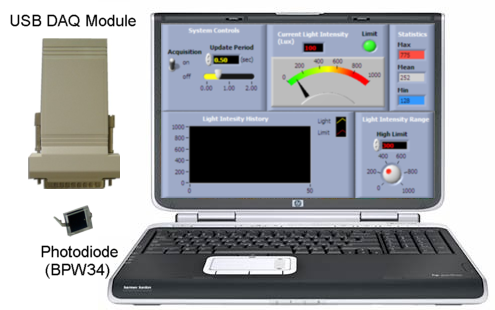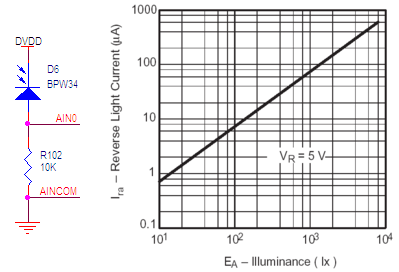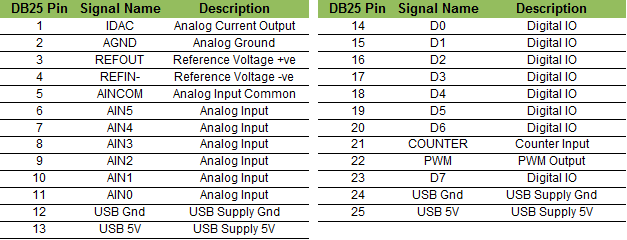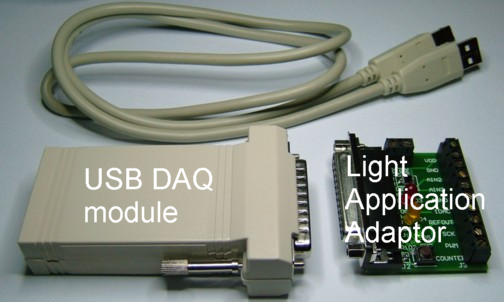Introduction
Computer based Measurement System

A computer based light intensity logger is made up of the following components
- Sensor - a photo-diode (BPW34)
- Data acquisition module
- Computer with programming software (Visual Basic)
 The
light sensor used is the BPW34. A photo-diode is designed to be
responsive to optical input.
The
light sensor used is the BPW34. A photo-diode is designed to be
responsive to optical input.
Photodiodes can be used in either zero bias or reverse bias. Diodes have extremely high resistance when reverse biased. This resistance is reduced when light of an appropriate frequency shines on the junction. Hence, a reverse biased diode can be used as a light detector by monitoring the current running through it. Coupled to a 10Kohm resistor, and given the specification of the BPW34 a simple relationship between lux (light intensity) and voltage is given by
lux = 1333 * VO
With the Data Acquisition Module (DAQ module), a regular computer can now be used to measure this voltage. The DAQ module contains an 24-bit ADC (analog to digital converter). During analog to digital conversion, a digital value can correspond to a range of analog values. Any analog signal within the zone of one least significant bit (LSB) will have the same digital value. This error is known as quantization error. The relationship between this error and the bit resolution is given by
error = 1 / 2^n where n is the resolution in bits of the ADC
For an 24-bit ADC operating over a 2.5V range, the accuracy you obtain cannot be better than 2.5/16777216 V or 0.15 uV. However due to noise, this is only achievable through careful wiring. In a typical application, a noise floor of about 18 bits or 9 uV is usually achievable.
EMANT3X0 DAQ Module
The DAQ module (EMANT3X0) has up to 6 differential ADC channels, one 8 bit current DAC channel, 8 digital I/Os and either a 16 bit PWM or a Counter. These inputs/outputs are connected to the outside signals/sensors through the DB25 pin connector.

EMANT3X0 DB25 pin out connection to the real world

The DAQ module is connected to the PC via the USB (EMANT300) or Bluetooth (EMANT380) port of the computer.
Light Application Adaptor

The Light Application Adaptor for the EMANT3X0 has the following connections
photo-diode BPW34 connected to AIN0 (input analog) of the DAQ module and the resistor connected to AINCOM.
Green LED connected to D0
Orange LED connected to D1
Red LED connected to D2
Switch connected to D3
Screw Terminals that connects the EMANT3X0 pin-outs to other sensors like the thermistor.
Visual Basic .NET 2010
In the early years of computing for Engineers, FORTRAN was a popular language. With the introduction of the PCs, Pascal became the language of choice for many programming classes in Engineering. This was followed by C, Visual Basic and C++. All these programming languages have strengths in different areas. Some (like C++) are powerful but difficult to work with while others (Visual Basic) are simpler but limiting in functionality or performance. Visual Basic was originally created to make creating graphical user interfaces easy. Visual Basic .NET is a very capable object oriented programming language that retains some of the easy to use features of the earlier versions.